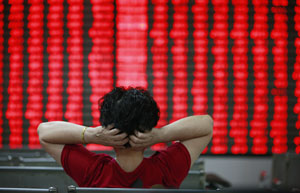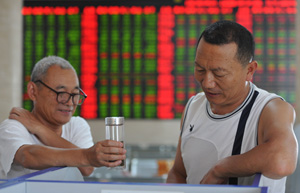The mainland's benchmark stock index rose to a 15-month high, led by defense and technology companies, amid speculation the government will increase military spending as part of its efforts to bolster economic growth.
China Spacesat Co and Aerospace Communications Holdings Co rallied 10 percent. President Xi Jinping called for more innovation in the country's armed forces and a new strategy for "information warfare", the Xinhua News Agency reported on Sunday.
Liquor makers Kweichow Moutai Co and Wuliangye Yibin Co paced gains for consumer companies most immune to swings in the economy. Hong Yuan Securities Co led a rally for brokerages, up 6.5 percent.
 |
 |
"Military stocks are leading the surge in the index," said Zhang Yanbing, an analyst at Zheshang Securities Co in Shanghai. "Investors are optimistic about the industry's reform. This is a big boost especially because related stocks are pretty huge State enterprises."
The CSI 300 Index gained 1.3 percent to 2,386.46. The Hang Seng China Enterprises Index added 0.1 percent. Trading volumes in the Shanghai index were 20 percent above the 30-day average.
A gauge of consumer-staples producers in the CSI 300 rose 1.5 percent. Kweichow Moutai and Wuliangye Yibin both rallied more than 2 percent.
Confidence among liquor dealers is recovering as mass consumption is picking up, Shenyin Wanguo Securities Co analyst Deng Jingdong wrote in a note on Tuesday.
Monday's data follow weaker-than-expected credit, production and investment data for July, suggesting the economy is losing momentum and adding to pressure on the government to step up efforts to meet its growth target this year.
Official and private gauges of the services trade for August will be released on Wednesday. The government's non-manufacturing PMI fell to 54.2 in July from 55 in June. The July reading for an index by HSBC Holdings Plc and Markit Economics Ltd came in at 50 in July, the lowest since the series began in November 2005 and down from 53.1 in June.
The Shanghai Composite has rebounded 14 percent since mid-March on prospects China will reduce government ownership of State-owned enterprises and the link between exchanges in Hong Kong and Shanghai will fuel inflows.
